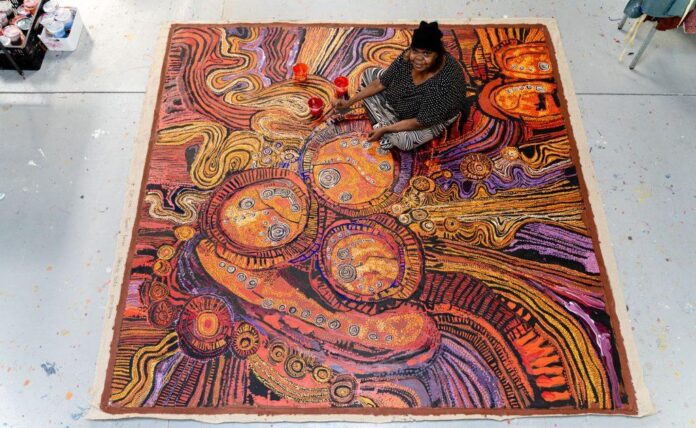The Australian government will launch an investigation into recent allegations that white employees at an Aboriginal art center interfered in the work of Indigenous artists.
The probe marks the latest development in a controversy that began last month when The Australian newspaper published a report claiming that staff members at Tjala Arts—a studio located in the Anangu Pitjantjatjara Yankunytjatjara (APY) Lands—had added paint to pieces created by well-known Indigenous makers.
Tjala Arts is one of 10 Indigenous-owned organizations that belong to the APY Art Centre Collective. Following the report, the group “strenuously” denied what it referred to as the “overarching narrative” that its members’ work was compromised, calling the claims “false and seriously defamatory.” The collective said that the non-Indigenous painters mentioned in the article were “professional art assistants” working under direction from the artworks’ authors.
“ claims it wants to open a debate on the role of art assistants in contemporary Indigenous art, but their reporting reveals that they have already taken a side on this debate without properly educating themselves on industry-wide professional practices,” the APY Art Centre Collective added.
For months, the APY Art Centre Collective has been working with the National Gallery of Australia on “Ngura Pulka – Epic Country,” a forthcoming exhibition at the museum branded as “one of the largest and most significant First Nations, community-driven art projects to have ever been developed.” The show is “being entirely conceived, created, directed, and determined by Anangu people,” the collective previously said.
But after The Australian story, the National Gallery indefinitely postponed the event’s planned opening on June 3 and announced the launch of an “independent review of the provenance and creation of the works in the exhibition.” The review is expected to be completed later this month.
In the meantime, elected officials appear to be following the museum’s lead. This week, South Australian arts minister Andrea Michael met with federal arts minister Tony Burke and Northern Territory arts minister Chanston Paech to plan a joint investigation into the allegations against the APY Art Centre Collective.
The inquiry will be funded by both the national and South Australian governments, but will be primarily organized by the latter, according to a statement from Michael. (The South Australian government is the one of the APY Collective’s central funders.)
“The allegations that have surfaced are concerning, and all three governments are determined to protect the integrity of First Nations art,” Michael said today. “We are committed to supporting First Nations artists to share their art with the world, and ensuring respect for their culture and stories is incredibly important.” The three governments have not yet provided a timeline for the project.
Latent in the investigation are long-standing issues involving the treatment of Indigenous artists by institutions that purport to prop them up. But this particular case may come down to the roles played by assistants at Tjala Arts and other APY Collective organizations.
“I won’t be telling First Nations artists whether or not they are allowed to be assisted,” Burke reporters in Canberra last week, per the Sydney Morning Herald. “What matters is to make sure that people have creative control. And to the extent that there are allegations that there was no creative control, then that’s important for us to be able to work through the facts on that.”
“But I certainly have no intention of implying a standard and set of rules around First Nations artists that are not applied to any other artists in the world or throughout history,” the federal arts minister added.

























